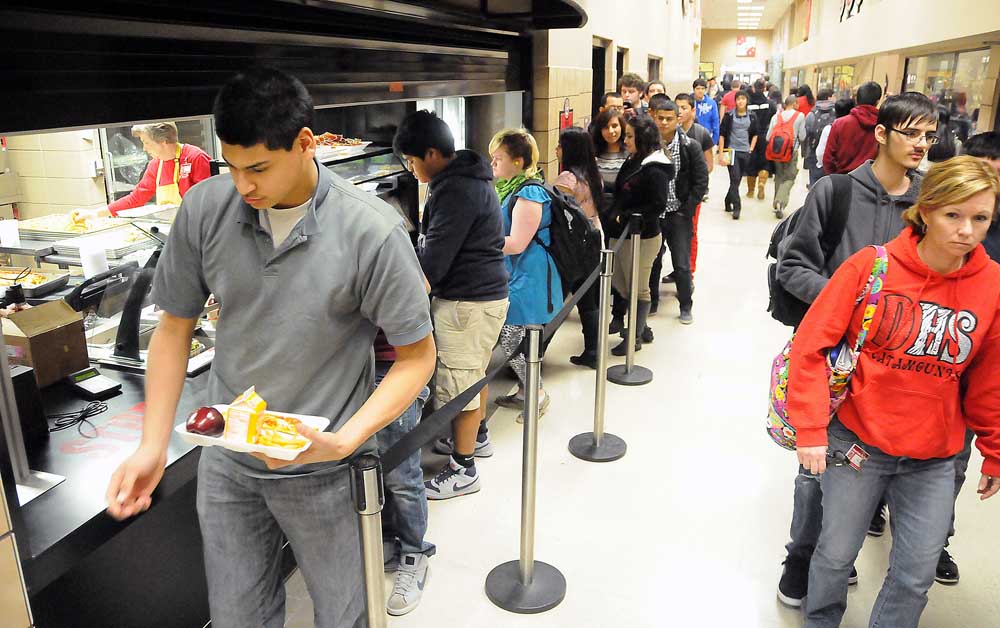Say goodbye to sweets: New snack guidelines require healthier food in schools
Published 11:30 pm Wednesday, August 13, 2014

- New federally mandated Smart Snack Guidelines require snacks made in the school that are not part of official school meals, and those sold through vending machines, to either be whole-grain-rich or have as a first ingredient a fruit, vegetable, dairy item or protein
Snack options at school just aren’t what they used to be.
In local school systems, and in districts throughout the country, students are adjusting to new snack standards that do away with sugary soft drinks and high calorie treats.
Trending
When purchasing food items during the school day, including from vending machines, in school stores and at school club fundraisers, children now have only healthy options to select from.
No more donuts, candy or chocolate.
New federally mandated Smart Snack Guidelines require snacks made in the school that are not part of official school meals, and those sold through vending machines, to either be whole-grain-rich or have as a first ingredient a fruit, vegetable, dairy item or protein.
Under the new guidelines, snacks and entrees outside of the lunchroom must meet calorie requirements as well.
The stricter, healthier requirements are part of the 2010 Healthy, Hunger-Free Kids Act and went into effect July 1.
“The rule applies to both what is sold by the cafeteria, items served during school hours for fundraisers, and by vendors. A la carte sales from the cafeteria will be affected also,” said Wimberly Brackett, director of school nutrition for Dalton Public Schools. “Food that is not sold is exempt from these restrictions (i.e., birthday parties, celebrations, etc.).”
Trending
Some of the changes are that beverages allowed at all grade levels include bottled water (plain, unflavored), non-fat milk (flavored and non-flavored), low-fat milk (plain only) and 100 percent fruit/vegetable juice, only, Brackett said.
“High schools are only allowed to sell diet beverages, plain and flavored water, and low- calories beverages,” she said. “No longer allowed to be sold in vending machines are full calorie soft drinks and full calorie Gatorade/Powerade/energy drinks.”
Sugary, fatty foods are outlawed, too. Many brands, like Cheetos and Rice Krispies, have already released foods that do fit within the limits.
Snack items sold must contain fewer than 200 calories per item as served, according to guidelines.
In Georgia, the changes may not be absolute.
The State Board of Education has publicly opposed the new guidelines. State Superintendent John Barge, in a news release, called the rules “an absolute overreach of the federal government.”
“Tough economic times have translated into fewer resources and these fundraisers allow our schools to raise a considerable amount of money for very worthwhile education programs,” he said.
To continue allowing traditional snacks, at least in the case of fundraisers, the State Board of Education has proposed a 30-school-day waiver/exemption to the rule.
“This means that, if voted upon, each school in a district will have 30 days in a school year to have fundraisers where they can sell food items that do not have to meet the nutrition standards,” Brackett said.
Georgia school systems will know how to proceed on Aug. 21, when the rule is expected to be voted upon by the State Board of Education.
Ultimately, “It is my hope that these new regulations do not hurt the schools’ fundraisers,” Brackett said. “I hope schools and organizations can find new, creative options for fundraising.”
Currently, the standards do not apply during non-school hours, on weekends or at off-campus fundraising events.





